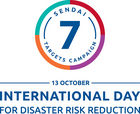News

Glaciologists meet in Iceland
The Icelandic Meteorological Office, the Institute of Earth Sciences, University of Iceland, and the International Glaciological Society (IGS) hosted the third IGS Nordic Branch Meeting held in Iceland in Reykholt last week. Scientists and students in glaciology and related topics presented their research results.. Most presentations were about glacier mapping, glacier geomorphology and glacier dynamics but outreach efforts about glaciers and discussions about glacier changes in a wider societal context were also on the agenda.
Read more
30th International Day for Disaster Reduction
The International Day for Disaster Risk Reduction was held the 13th of October as every year since 1989. The day was designated by the United Nations General Assembly, with the aim to promote a global culture of risk-awareness and disaster reduction, including disaster prevention, mitigation and preparedness. The day is an opportunity to create global awareness about disaster risk reduction, the progress made and to encourage further efforts to build disaster resilient communities and nations.
Read more
Glacier change sessions at this year's Arctic Circle Assembly
Changes in the area and volume of ice and snow are strong indicators of global warming and nowhere are such changes more visible than in the Arctic, where the warming rate is presently twice as high as the global average. At this year's Arctic Circle Assembly, scientists from the Icelandic Meteorological Office (IMO) led sessions and workshops on melting glaciers in the Arctic region. This is one of four topics that will be highlighted during Iceland's chairmanship of the Arctic Council in 2019–2021.
Read more
The weather in Iceland in 2018
The year 2018 was wet and relatively warm. The precipitation was well above average in most parts of the country and the number of precipitation days was considerably higher than normal both in the South and in the North. The summer months were relatively cold in the southwestern part of the country compared to the last ten years while it was warm in the northeastern part. There was exceptionally little sunshine in the southwestern part of the country during the year. The number of bright sunshine hours in Reykjavík have not been as few since 1992. June and July were particularly gloomy in the South West. The last two months of the year were warm. Wind speed was close to average
Read more


